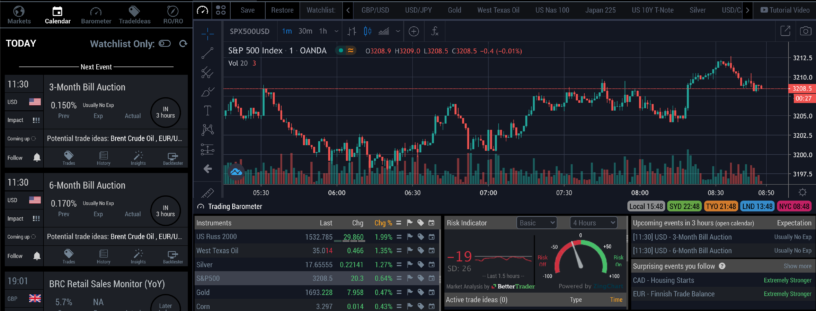Macro News Events
Perhaps the greatest and most relevant macro news event is the current COVID-19 pandemic, and its impact on the global stock markets. The predominance and uncertainty of COVID-19 has proven to be extremely detrimental to national economies all over the world, and responsible for the massive point drops that took place during the end of February and the month of March. Initial drops resulted from the uncertainty of consumers and their loss of spending ability as they sheltered in place, coupled with a massive increase to record high unemployment. With the extensive job losses and decrease in spending and consumer confidence, most national economies and stock markets were sent into a downward tailspin.
The lack of economic activity has proven to be detrimental to many investments, as many commodities, such as oil, and various others were sent into a period of volatility. The unpredictability of the market, with fluctuations depending on medical and social advancements, has decreased the confidence of investors. Currently, the economic situation in the US has improved with a scheduled phased reopening in addition to a government aid program infusing the economy with trillions of dollars. The negative effects of the global COVID-19 crisis will continue to affect the economy for years to come, with many possible negatives that result from the lack of spending and debt.
Macro events like COVID-19 are far and few between, but understanding the impact an event like this can have on the market is important. The direct catastrophic effect COVID-19 had on the stock market proves the intertwined relationship between macro news events and the stock market.
Political Events
There are many political and economic indicators that drive a broader market sentiment. Many investors pay attention to the current unemployment rate, GDP, and the monthly jobs report. These numbers are largely a result of economic policy and can be influenced by political opinions. A lower unemployment rate, high jobs report, and high national GDP typically result in a broad boost in the stock market and economy.
The monthly jobs report by the US depicts whether hiring is picking up or slowing down, which is a strong indicator of future levels of economic activity. When there are indications or greater employment figures, the confidence in the economy is directly seen through increases in the stock market. The upcoming May 2020 jobs report holds specific importance in relation to confidence in the economy moving forward in a time of pandemic uncertainty. If the report indicates a positive direction in job creation or a lesser number of jobs lost, there is a potential direct increase in the stock market. If the jobs report indicates a substantial decrease, or a report that did not meet expectations, the market will react accordingly.
Natural Disasters
As devastating and costly as some of the various natural disasters, the impact on the stock market is not as large as one would expect. The lack of percentage losses that take place following a natural disaster is less than the percentage economic boost that takes place from the recovery efforts. Research has concluded that the drop following a natural disaster is greatest on the day of the disaster, and continues to linger for the next 2 days. The markets are then quick to bounce back following the incident, and prove to reach higher levels than before due to the influx of spending for relief efforts.
This fluctuation can be seen through both Hurricane Katrina in 2005 and the recent Hurricane Harvey in 2017 in the United States. The resulting destruction cost $108 billion and $125 billion in damages, respectively. The market response was typical: a 2-day drop in the market, with a quick return to normal. This can be applied to many disasters as the drop in the market is typically short-lived. Immediate action can result in profits on both the same day decrease and the following increase days later.
Government Fiscal or Monetary Policy
One of the main government fiscal or monetary policies that can impact the stock market is through interest rates. Governments are able to set an interest rate in an effort to control the rate of inflation or deflation in an economy. In the case of the US, when the FED sets the federal funds rate, the newly offered government securities are set to a designated interest rate. When there is a higher interest rate, treasury bills and bonds become increasingly desirable as the almost risk free investment becomes more profitable. When more money is invested into bonds as opposed to the stock market, the stock market has been seen to decrease as less money is invested. Higher interest rates also deter consumer spending due to the increased costs of borrowing money, meaning less money is spent in the economy.
An example of this can be seen in an 832 point drop in the Dow on October 10, 2018 as a result of speculation of higher interest rates. Although the interest rates were not adjusted at that time, the speculation of adjustment was the root of the point drop. By the time interest rates are actually altered, it is more likely than not that this effect has already been priced into the market.
Another government policy that can directly impact and benefit companies is through tax cuts. Government tax cuts can infuse a company with more cash than previously before, allowing that company to engage in stock buybacks, product development, and salary increases. Although all three increase a businesses’ stock price, the use of stock buybacks has a direct relationship to that company’s stock price. This can be observed through the 2017 tax cuts in the US. From the tax cuts, stock buybacks were the most popular use of money for public companies, causing a collective increase in the stock market. When a company engages in a stock buyback, that company is buying back their stock from an exchange, increasing that stocks demand.
Wars or Conflicts
Wars and conflicts can directly impact an economy through affecting the confidence of consumers, while also benefiting companies involved in the military efforts. The confidence of consumers in an economy is essential for investments. An example of a military conflict that spiked a massive drop in the stock market is the terrorist attacks on September 11th, 2001 in the US. As a result of the terrorist attacks, the Dow dropped by 7.1%: one of the largest one-day losses ever. The huge market move was a reaction to the uncertainty concerning the economic and political future of the country, including possible further attacks or impending war. This uncertainty caused people to get out of the stock market, and stock prices plummeted. Researchers have concluded that terrorist attacks account for the largest single day drops of all types of disasters, largely due to their psychological impact on the country. However, the market is quick to return following an attack and can be observed to return to previous standards within the next 1-2 days.
War can also be an economic boost to an economy through the increased output of supplies and production. Many companies related to the military can dramatically increase profits in times of war, increasing their stock prices. In general, war can be observed to help an economy as a whole. World War II brought the United States out of the Great Depression through creating a demand of labor and production. Without World War II, the US would not be where it is today.
Technology Changes
As technology continues to evolve and improve, pushing society forward, it also impacts the growth in the stock market over time. Many individuals are gaining access to the stock market through new trading apps and platforms, infusing more money into the market. Many new trading platforms have accommodated all the various types of investors, increasing the outreach and availability of the market.
Technological advancements have also played a large role in stock market expansion, in addition to causing various bubbles due to over expectations. An example of this can be observed through the dot.com era from 1995-2001. The advent of technology with the internet proved to be an extremely lucrative time period for investments, as the NASDAQ grew by 682% over the course of those 5 years. The internet was revolutionary, and the expectations and confidence in the technology was the root of this massive increase. These vast expectations continued up until 2001, when the stock market crashed in what’s now known as the dot.com bubble. The high expectations of the new technology in the internet led to massive confidence in the stock market, leading to an unrealistic prediction for the future.
Today there are constant technological advancements and ideas pushing society forward. There will continue to be technological advances in society impacting the belief in the stock market, and there is equal importance in recognizing the risks associated with investment. The excitement surrounding technology can sometimes push and overvalue a stock without profitability. It is important to not let the excitement surrounding technology overshadow the true evaluation of the companies behind it.

















